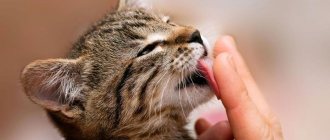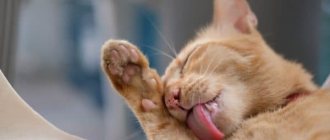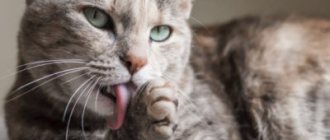The sense of smell is the main organ
Animals, unlike people, don’t just smell – they read it. The sense of smell for cats is known to be extremely important. Thanks to this organ, cats find a partner for mating, hunt, and receive information. It is also an organ of communication. The main task of the sense of smell is to notify the cat for a lightning-fast reaction: with its help, she finds out what the smell carries - a threat or unpleasant sensations or, conversely, pleasure. Thanks to smells, animals navigate the environment, delimit territory, etc. Traces of memory about various aromas are never erased or dulled in the cat’s brain, but are forever fixed in the center of long-term memory, as if in a bank of smells. Aromas that are seductive and attractive to our smaller brothers can be repulsive to humans. Just like a neutral smell that is not memorable for a person can be extremely important for his beloved pets.
Cats know their owners by smell
To a cat, what you look like doesn't matter much. Your cat identifies you through your scent when sniffing you and sometimes through your voice.
This is why cats may react differently or negatively to their owners when they smell a scent that is unfamiliar to them. If you use a new scent with notes of citrus or spice, there's a good chance your cat will stay away.
Your cat may also keep a safe distance from you if it recognizes the scent of another animal on you. This could be after visiting a veterinary clinic, a farm, or after petting your friend's dog or cat. This is temporary behavior.
Causes of odor
Human sweat glands are divided into two types: apocrine and eccrine. With any increase in body temperature, the eccrine glands begin to work intensively, trying to normalize the temperature in order to prevent the body from overheating. When these glands operate, a substance consisting of water and various salts is released. Eccrine glands are located virtually throughout the body and have access to the surface of the skin.
The largest concentration of these glands is on the palms and soles of a person’s feet. Apocrine glands are associated with the hair of the body, therefore they are located mostly in the armpits and in the genital area. When working, these glands secrete a cloudy liquid that is odorless until it encounters bacteria on the skin surface.
World of cat scents
By the way, cats also have unloved odors:
- Cats are not fond of citrus scents. If you put the skins of oranges or lemons in the pot of a flower that your pussy is nibbling on, it will ignore that place.
- You can spray the area where you don't want a cat's presence with acetic acid. Cats cannot stand this smell. It will seem to a person that it has disappeared within just a few minutes, but your mustachioed friend will feel it for a very long time.
- Lavender, mint, and rue are suitable as natural “horror stories.” They can be placed in a garden area where there is no place for cats.
- You can buy cat repellent spray in specialized stores. The method of application is simple: where the cat has adapted to walk “big”, you need to spray the spray. Animals avoid such places; they don’t like them.
A person in modern society is simply obliged to observe the rules of personal hygiene, smell nice and look neat.
But what to do if all the rules are followed, but an unpleasant odor still emanates from the body? Every person, under certain conditions, tends to sweat. The smell of sweat is different for everyone, but it happens that the sweat takes on a sour smell, the smell of ammonia, vinegar, or even worse - the sweat smells like cat urine. Human sweat consists of 99% water, and 1% urea, salts, acids and other chemical compounds. If he starts to smell like cat urine, this indicates an increased secretion of urea and uric acid. These substances settle on the hairs in the form of crystals and cause unpleasant odors. Moreover, a similar phenomenon is observed in both women and men. People’s first reaction: what will others think of me, will they judge me, criticize me. But in this situation, you need to think not about the gossip around you, but about your own health, since any unpleasant body odor can be a symptom of very serious diseases of vital organs. In this case, get tested as soon as possible.
How does the process of smell recognition occur?
When inhaled, air flows into the sinuses. The odors contained in it are deposited in the mucous secretion on the olfactory epithelium and, with the help of nerve endings, are transmitted directly to the cerebral cortex, where they are interpreted.
The human sense of smell operates in a similar way, so differences in this process are of greater interest. The cat's body is able to recognize certain odorous substances when they are injected directly into the blood, as well as through the Jacobson's organ, which is present in humans as a rudiment.
No one knows for sure what the reasons for this behavior are
Genetics plays a certain role (most cats that demonstrate this behavior are oriental breeds (Siamese, Burmese, etc.) or their crosses), as well as early weaning of the kitten from the mother's breast. Young kittens have a very strong sucking instinct, and early weaning upsets cats' natural instincts and promotes this behavior.
Early weaning leads to kittens sucking their owners' earlobes, their fingers, or trying to suckle other pets. Kittens should never be taken away from their mothers before 8 weeks of age, and should ideally remain with them until at least 12 weeks of age.
How to break your pet's habit
When an owner is annoyed by such excessive attention from his cat, there are several ways to try to get rid of this habit:
- A game. By switching attention to entertainment and giving your pet an outlet for energy, you can relieve her for a while from the desire to lick something or someone.
- Weasel. If the problem is stress or lack of attention, you need to pet and hug the animal more often, and the problem will disappear soon.
- Change of interests. Apply a special solution – catnip – to your pet’s toys. It is sold in pet stores. Its scent will attract the cat's attention.
- Refusal. If your pet's behavior becomes overly intrusive, every time he tries to lick him, you need to gently but decisively push him away and make it clear that this is not worth doing. After some time, the method will work and the cat will stop trying.
- Substitution for another item. Buy a fur mitten and put it on your hand every time you try to lick your fingers. After time, attention will switch to the object, and the owner will no longer be needed.
It is worth remembering that such behavior of a pet can be due to a whole range of different reasons and there is no need to get angry or scold him for it. After all, with such behavior the cat does not want to cause harm, but is simply trying to attract the owner’s attention to his person or show love.
Why does a cat sniff a person's face?
1. Why does a cat sometimes try to lick your face or hair?
The first impression that a kitten receives from its mother is care in the form of licking and washing. For him, this is an act of care and concern, so if the cat (or cat) tries to lick you, take it as an attempt to take care of you in a motherly way.
2. Why does a cat, lying in your arms, move its paws, “beating” something ?
The reason again lies in childhood. A kitten feeding on mother's milk, massaging the cat's belly with its paws, stimulates the “supply” of milk. An adult animal uses this technique to show extreme comfort and satisfaction.
3. Why do cats usually go to the arms or legs of someone who doesn’t like them?
When one cat tries to scare another, it arches its back, raises its fur, and lets out a menacing hiss. If a person does not like cats, he tries to sit quietly so as not to attract the attention of the animal. And the cat considers this a sign of favor. Doesn't hiss, doesn't move - that means he's a friend.
4. Why does a cat try to hit its head on a person?
Sometimes a house cat will come up and lightly bump its head against the legs of family members. It turns out that this is a way of expressing affection, and they can express this behavior in relation to other members of their tribe, not just people.
5. Why do cats rub against furniture, table legs, legs?
Cats have special glands on the tail, on the sides of the head, on the lips, on the tongue, near the genitals and between the front legs. They use them to mark their territory. When a cat rubs against your leg, he is marking you, indicating that you are “his.” For the same reason, cats rub against furniture and corners of rooms.
7. Why does a cat, when passing another cat, slow down and move slowly?
All cats are territorial animals. They distribute territory among themselves depending on the level of the internal hierarchy. Any encroachment leads to open conflict. Therefore, if a cat just wants to pass by, it tries to slow down and not look at the owner of the adjacent territory at all.
8. Why does a cat, when burying the “results” of its life activity, dig outside the box and not inside?
This is due to the innate tendency of cats to cleanliness. The cat is just trying not to get his paws dirty. The thought that his actions are ineffective does not occur to him.
9. Why do cats purr?
Cats make purring sounds for many reasons. A mother cat purrs to her kittens to show that she is nearby. The kittens respond in kind, indicating that everything is fine. Young cats purr to each other, inviting them to play. An adult cat purrs, indicating that he is in a good mood and is not encroaching on another cat's territory. By the way, the method of purring has not yet been studied, that is, how cats make such sounds.
10. Why does a cat sometimes scratch the floor or “bury” a bowl of food?
This can happen for two reasons - either the cat is trying to bury food “in reserve”, or by such an action it shows that he does not like the food.
11. Why do cats bite and lunge?
Kitten games always include sitting in ambush, surprise attacks and throws. Therefore, cats at any age love such children's games. Draw their attention to laces with a bow, balloons and more.
12. Why are some people allergic to cat hair?
Strictly speaking, the allergy is not caused by fur, but by the FEL D1 protein contained in cat saliva. When a cat washes itself and licks itself, it transfers saliva to its fur, after which it can end up on furniture and carpets. Different individuals have different amounts of protein secreted, but in general, cats are less allergenic than cats. There are two ways to prevent such an allergy - bathe the cat, rinsing the substances from the fur (which is not recommended to do often), or wipe the cat's fur with a special soft cloth.
13. Why does the cat turn his back to you if you don’t pay attention to him for a long time or leave?
To maintain cleanliness
Self-licking is a natural and very common mechanism for caring for one's own body in the animal kingdom.
Kittens begin to lick themselves from the age of four weeks, and before that, all manipulations regarding the infant toilet are performed by the parent.
Cat licking rituals like these are a demonstration of love for cleanliness:
- The cleanest . Sometimes it seems that keeping oneself clean is the main task of a feline brother. Taking the most graceful poses, Murka licks herself for hours, touchingly washes her face with her paws and rubs her ears. She does this many times a day: after sleeping, feeding, taking care of her natural needs, and even stroking her. A cat's tongue, covered with miniature hooks and therefore rough to the touch, combs and arranges hairs like a brush, removing dirt and foreign odors. During this massage, blood flow is stimulated and the skin glands intensify the production of an oily secretion, which lubricates the hair and protects it from moisture.
- “No” to foreign odors . The desire to lick a person may be motivated by the desire to destroy unusual scent marks. According to the cat's understanding, all perfumes, including perfumes, soaps, shampoos and creams, have unnatural and even unpleasant odors, which must be urgently gotten rid of. This is why the cat spends so much time and carefully licking its own area of the body with medicinal ointment applied to it.
- Tempting aromas . Some cosmetics, on the contrary, can be very attractive to mustachios. Such, for example, is a hand and nail cream with an extract of medicinal valerian, which has a magical effect on cats and activates the owner’s obsessive licking. Some cats love the smell of peony tincture and therefore tend to lick the hands or lips of a person who has taken this sedative. Cats are also attracted to human sweat, which contains odorous substances similar to animal pheromones. So the owner, returning from a morning jog or after a hard work shift, smells very attractive to the murka.
Health risks
First, breathe a sigh of relief. Because your armpits don't smell bad enough to make your cat sick. She just loves doing it for all the reasons described above.
But problems may arise if you use deodorant. Deodorants contain toxic substances that can harm your pet's health. This may cause itching. So keep your cat away from you if you apply too much deodorant.
As for your cat loving the taste of salt, it's not a bad thing for your pet. It's normal for cats to crave the taste of salt.
And don't worry, this doesn't necessarily mean your cat has a mineral deficiency.
Cats greet each other by sniffing their butts
Butt sniffing is a socially acceptable and healthy form of communication between cats. The smell of a cat's butt can provide a lot of information.
The cat's rectum contains the anal glands. These are two small sacs, through two holes that release an unpleasant-smelling substance into the rectum. A cat's anal glands empty each time her rectal sphincter contracts during bowel movements.
However, it can be difficult for owners to detect the odor of the anal glands because the odor is overwhelmed by the smell of your cat's feces. Cats have a more acute sense of smell and can therefore tell them apart.
Why do cats sniff butts?
Even though the butt greeting rituals are weird, felines have a purpose. A cat gets enough information from the smell of another cat's butt to tell whether it is friend or foe, a good companion or a nuisance. Is the new cat young and a threat to the other cat's territory?
Each cat has its own unique butt smell. This smell serves as identification of the cat. Butt sniffing helps cats determine if they've met before.
This helps establish dominance between the two cats. A cat that starts sniffing ass is often the dominant cat. A dominant cat will stop sniffing and become aggressive by hissing to complete the introduction.
Keep in mind that not all cats greet the same way. Some cats are shy and limit the amount of information they provide. So they sit down, cover their rectum with their tail, and limit the scent they emit.
Anti-stress therapy
Animal psychologists know that an agitated animal increases the production of saliva and develops a desire to lick itself or surrounding objects:
- Cat auto training . Any monotonous action in an alarming situation leads to a decrease in arousal. Prolonged self-licking of fur, in turn, additionally stimulates sensitive skin receptors and activates the pleasure center in the brain. Thus, a cat experiencing stress turns on its mental defense mechanisms and “withdraws into itself.” With repeated exposure to adverse factors, self-licking can turn into mania, leading to weeping eczema and granuloma.
- Owner-psychotherapist. In an attempt to relieve stress, cats may lick a person's hand. This is exactly how an animal behaves on a trip or during a visit to the veterinarian, provided there is a trusting relationship with the owner. Contact with a familiar palm and pleasant reciprocal stroking of the fur shifts the pet’s attention and has a calming effect.
Raising cats - how to wean cats from “bad” habits?
With their legendary curiosity, cats can cause a lot of trouble. But tailed pets are difficult to train; you need a lot of patience. For those who do not want to bother themselves with such difficulties, you can take into account the dislike of cats for certain smells. This will help scare away the mustachioed striped ones from those areas where they do not belong. What smell do cats not like?
- Cats hate citrus scents. If you crumble the skins of oranges or lemons into a flower pot that your cat has gotten into the habit of nibbling, she will no longer come near it.
- You can spray the area where you don't want a cat's presence with vinegar. Cats hate him. For humans, the vinegar smell will become invisible after a few minutes, but cats will smell it for much longer.
- Lavender, mint, and rue can also act as natural scarecrows. They can be planted in a garden area where the presence of cats is undesirable.
- You can buy cat repellent spray at pet stores. The method of using it is simple: where the cat has become accustomed to shitting, you need to spray it with a spray. Cats avoid such places; they don’t like them.
- Cats are also repelled by essential oils made from lemongrass or orange. You can prepare a mixture based on rosemary, cinnamon and lemongrass by adding three parts of water.
The mixture should be sprayed daily until the cat realizes that these places should not be approached. After a long time, the pet may forget unpleasant associations and return to forbidden places. Therefore, the owner will have to repeat spraying from time to time. You can also not spray the solution, but make cotton balls, dip them in the product and scatter them where needed.
Useful materials:
- Cutaneous horn General description of the disease Cutaneous horn on the forehead or face (ICD 10 code - L57.0) -...
- The cat has cancer Stages of mammary gland cancer in cats Like in humans, cat mammary cancer has ...
- Itching and odorless discharge Main causesBefore considering the factors that provoke the appearance of discharge that has a sour odor, it is necessary to immediately note...
- Normal temperature in animals Normal temperature in different types of animals Veterinary services Day hospital for animals Veterinary certificates Vaccination…
What senses are closely related to a cat’s sense of smell?
In addition to smell, cats have well-developed other senses. They are all closely related to him
:
- Touch
. The joint work of the whiskers and the cat's nose makes it easier to find the mother and her nipple, as well as other important objects.
- Taste
. Delicious food must smell good. Thanks to its developed sense of smell, the pet determines the edibility of food before trying it.
- Hearing
. The cat's ear even detects ultrasound, and the nose detects the slightest changes in the chemical composition of the air. All this allows cats to recognize natural disasters before they occur.
- Vision
. Despite developed night vision, animals are not able to see in pitch darkness. In such cases, they rely on their sense of smell, hearing and touch.
The listed feelings, of course, play a big role in the life of mustachioed pets, but their loss is not fatal. Complete disorientation is caused only by the loss of olfactory function. In the wild, such animals do not survive, since along with their sense of smell, all other senses are dulled. This increases their vulnerability and shortens their overall life expectancy.
Do you like the article? 249
Symptoms of diseases
There are cases when licking people is a desire to draw attention to the pet’s health problems, and not a show of love or a request for affection. These may be diseases or conditions such as:
- Skin parasites, including fleas. The cat worries not only about itself, but also about the people around it, and is trying to get rid of the problem.
- Allergy. If feeding is incorrect or the food is changed, skin problems can occur, which leads to excessive licking of yourself and those around you.
- Disturbances in general health. By licking frequently, the animal tries to signal that something is wrong with it. It is important to notice changes in behavior and contact a veterinarian promptly.
- Infectious diseases. Some of them cause itching and rashes on the skin, which irritates the pet and he tries to get rid of it in this way.
What is Jacobson's organ in cats - and what is it responsible for?
Jacobson's organ, or vomer, consists of 2 narrow canals. These canals are located in the upper palate, just behind the front incisors. The surface of these canals is also lined with olfactory epithelium. The difference is that it does not focus on a general set of aromas, but on a specific type.
The true purpose of the vomer has not yet been proven. Felinologists argue between the following theories:
- perception of cat pheromones;
- oral sense of smell, which allows the cat to distinguish edible from inedible;
- prediction of disasters (earthquakes, fires, floods), possible by detecting minor changes in the chemical composition of the air.
Recognizing the use of a vomer is quite simple. At this moment, the animal takes a characteristic pose: it freezes, opens its mouth slightly, wrinkles its nose, lifts its lip when inhaling air and gathers the skin on its head into a kind of grimace, or “flehmen smile.”
Prices
It’s strange to refuse hair removal services in salons. When compared to the cost of trying to do the procedure at home, the price of armpit waxing will be lower. Each salon sets its own prices for procedures. They depend on the level of service, location, professionalism of employees, and the products they use. But the difference in prices is insignificant.
Sign up for high-quality armpit depilation at our SUGAR-ME salons!
| Waxing | Price, rub.) |
| Bikini area | 1100 |
| Hips/legs | 600 |
| Full legs | 1000 |
| Hands, 1/2 | 500 |
| Full hands | 800 |
| Abdominal area (track) | 300 |
| Abdominal area (entirely) | 500 |
| Back, 1/2 | 500 |
| Full back | 900 |
| Buttocks | 500 |
| Face (upper lip) | 200 |
| Face (1/2 face) | 400 |
| Full face | 600 |
Tags
life of a cat Cat licking that cats exhibit specific smells specific smells adore the smell of dirty Cats have several constantly the cat licks Why cats are attracted Why cats are attracted Why cats are attracted to people. Cats can kittens. Why cats are attracted to the love of cats if cats lick human sweat or sweaty armpits. human sweat. human sweat the smell of sweat. The sweat contains the smell of sweat affects the sweat contains the sweat so they perceive human sweat Why cats Why cats Why cats Why cats Why cat Why adults
one nose street master's head more dog specific no clothes










